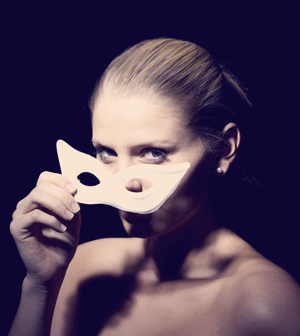Happy Halloween. You know we love it in New Orleans: any excuse you can find to put on a Halloween mask, hide your identity and party your ass off is something that we cannot resist.Joie de vivre and New Orleans have been synonymous for as long as I can remember.I decided to look up the term joie de vivre on my handy Wikipedia, and found an interesting entry therein, in a reference to psychology:
“Joie de vivre has also been linked to [psychologist] D. W. Winnicott’s sense of play, and of access to the true self. True self and false self are terms introduced into psychoanalysis by D. W. Winnicott in 1960. Winnicott used the term ‘True Self’ to describe a sense of self based on spontaneous authentic experience, a sense of ‘all-out personal aliveness’ or ‘feeling real.’ The ‘False Self’ was, for Winnicott, a defense designed to protect the True Self by hiding it. He thought that in health, a False Self was what allowed a person to present a ‘polite and mannered attitude’ in public. But he saw more serious emotional problems in patients who seemed unable to feel spontaneous, alive or real to themselves in any part of their lives, yet managed to put on a successful ‘show of being real.’ Such patients suffered inwardly from a sense of being empty, dead or ‘phoney.’ True self is sometimes referred to as the ‘real self’.”
Well, if that isn’t a description of New Orleanians, I don’t know what is.
 In New Orleans, we have the unique ability to easily show what some people think of as their true selves by putting on a costume almost any time, anywhere. I see this phenomenon often from my office at Frenchmen and Decatur, when a spontaneous parade of costumed revelers rounds the corner onto Frenchmen (and not just around Halloween either). It’s easy for us to put on a mask, and let ‘her rip. But this is where it gets kind of complicated. Are those costumes allowing us to show our true selves, or are they just hiding our false selves?Are our costumed “true selves” really party-hearty all the time, or are they a mask for our false selves which in turn mask our true selves?
In New Orleans, we have the unique ability to easily show what some people think of as their true selves by putting on a costume almost any time, anywhere. I see this phenomenon often from my office at Frenchmen and Decatur, when a spontaneous parade of costumed revelers rounds the corner onto Frenchmen (and not just around Halloween either). It’s easy for us to put on a mask, and let ‘her rip. But this is where it gets kind of complicated. Are those costumes allowing us to show our true selves, or are they just hiding our false selves?Are our costumed “true selves” really party-hearty all the time, or are they a mask for our false selves which in turn mask our true selves?
Whoa.
Do costuming and masking provide us with an outlet to make contact with people that we wouldn’t ordinarily have access to in our everyday mundane lives? Well, the answer is undoubtedly yes. But, on the other hand, are our contacts and connections with people so tied into the partying/masking that our interactions with others aren’t valid connections with the real people? In other words, do our social interactions in New Orleans “mask” getting through to more serious interaction?
New Orleans, as we know, is a very social town. If you want to do business here, much of it—more than in a lot of other cities—is done via social interaction: the party, the carnival krewe, the right bar. You could be the dumbest, or sleaziest business person; or the most anti-idealistic politician. If you possess the right social skills—the right mask—you can easily be very successful. The mask in New Orleans works like a charm.




